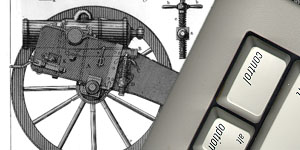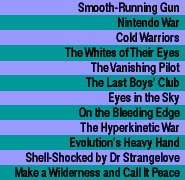


Nintendo War
Gone are the days when a captain could stand on a ship's bridge and see everything important through a pair of binoculars. Nowadays, a warship's radar extends at least a hundred kilometers in every direction---from four to ten times farther than simple binoculars. Nor does its vision go away at night or in fog. Nowadays, the captain's place isn't on the bridge, it's in the warship's computer nerve center.A darkened room of glowing consoles and tiny blinking lights, the control room may as well be underground, far from the ship it commands. During war, the only physical feedback officers there get is the noise of departing missiles and the swaying of the room as the ship heaves through the swells.
For these officers, war has become a video game. Enemies are no longer ferocious warriors with teeth bared and weapons raised. They are blips on a phosphorescent screen with little symbols showing what a computer thinks they are. If the program controlling that computer is wrong, the information is wrong and the officers make mistakes. More often though, the emotionless computer is right but its displays are badly designed; and in the fever of war the officers are likely to misread the computer's messages.
In 1988, the American cruiser U.S.S. Vincennes carried the most sophisticated ship defense on the planet---six hundred million dollars' worth of electronics to detect, identify, and target scores of planes, ships, and submarines within a three-hundred-kilometer radius. Unaided, it could assign dozens of missiles, torpedoes, rockets, and guns to its targets and automatically track them while waiting for firing orders. In case of all-out attack, the captain could give the system complete control of all weapons and sensors.
On Sunday, July 3, 1988, at a tense moment in the Persian Gulf during the Iran-Iraq war, the Vincennes was attacked by Iranian gunboats. The ship's officers, who had been warned just that morning that Iran had deployed fighter planes that might attack the flotilla, mistook a distant Iranian commercial jetliner for an attack craft.
Just a year before, an Iraqi warplane had accidentally fired two Exocet missiles at another American cruiser, killing thirty-seven and wounding twenty-one. Faced with a possibly similar threat, the Vincennes waited as long as possible, then shot down the plane while it was still fifteen kilometers away. Two hundred and ninety civilians died.
Four decades earlier the cruiser couldn't have shot down the airliner. Before doing so its aircraft carrier group would have had to loft a warplane to make visual contact just to aim the missile properly. The pilot might then have seen that the target was an airliner and not an attack plane as reported.
That can no longer happen. Nowadays, computers can handle all the aiming and firing. Once upon a time, ships had to board each other with cutlasses bared to decide a sea battle. Today, naval battles can be fought and won in five minutes by combatants a hundred kilometers apart. Smart weapons and long-range scanners have so distanced mariners from their battles that a warship's commander sometimes has to decide in seconds---based only on a blip on a screen---what action to take. The rule in war is that if the foe is in range, then so are you.
With the time to decide life-and-death matters sometimes reduced to seconds, we have less control. As computerized antiship missiles like the Exocet got better, ships started carrying computerized guns that can fire automatically on anything approaching the ship that looks like a missile. There's no longer time for John Wayne to smoke a meditative pipe as he plots an attack on the enemy's ships. Too many things happen too fast and too far away for warriors to make eyeball contact. As a result, mistakes happen.
On the other hand, mistakes always happen---particularly in the chaos of war. And perhaps human-computer systems make fewer mistakes today than unaided people did in the past. Unfortunately, because our systems are far more complex, powerful, and integrated, the consequences of today's mistakes can be far graver than yesterday's. When village waterwheels were our main source of power and bows and arrows our main weapons, a mistake in the way we use them couldn't affect that many of us. Things are different in an era of nuclear power stations and nuclear weapons. Blundering while hurling a spear is one thing; blundering while launching a space shuttle is another.